We include products in articles we think are useful for our readers. If you buy products or services through links on our website, we may earn a small commission.
Electrolytes For Fasting: Needs, Benefits, and Best Supplements
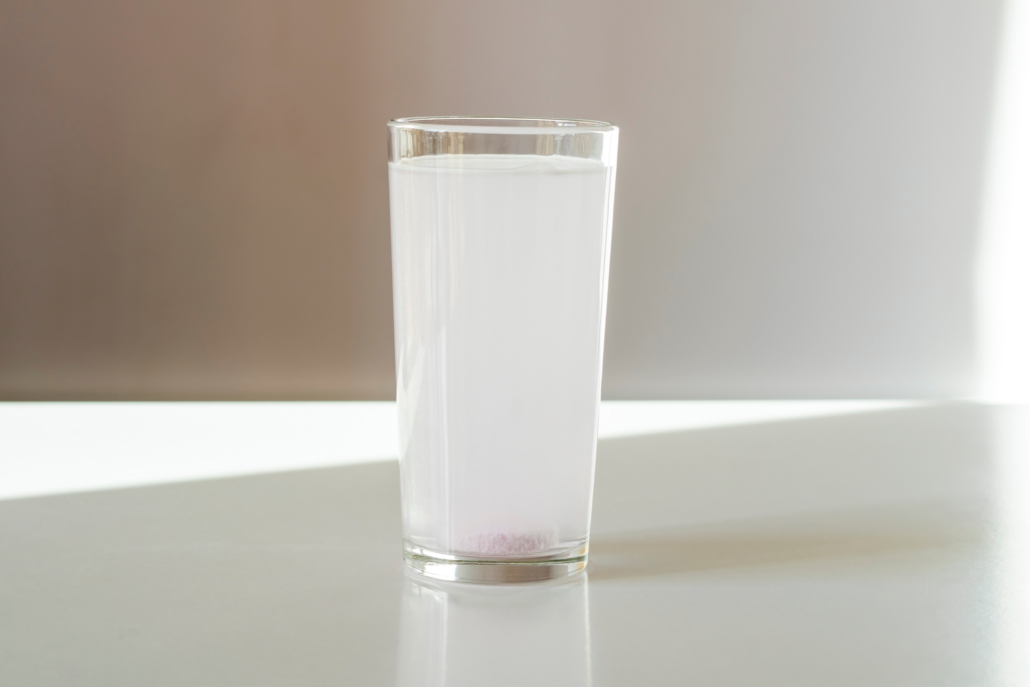
Fasting for prolonged and intermittent periods has gained widespread popularity for its powerful health benefits ranging from weight loss to cellular repair and renewal. However, as we embrace fasting as part of our lifestyle routine, it is important to understand the impact on our body’s electrolyte balance. For many people, supplementing with specific electrolytes for fasting is a critical part of their practice.
In this article, we’ll outline the fasting-specific processes your body goes through that impact electrolyte balance. And we’ll offer a rundown of the best electrolyte supplements for fasting.
Table of Contents
Why People Consume Electrolytes for Fasting
During prolonged and intermittent fasting, our bodies undergo various physiological processes that impact our electrolyte balance.
Most of the electrolyte loss when fasting occurs in the early stages and tapers off during prolonged fasts.
Research has found that after initial rapid potassium loss, excretion of potassium tapers to a steady 10 to 15 mEq/day.
Sodium follows a similar spike and taper pattern, where the body excretes between 1 and 15 mEq/day during prolonged fasts.
Here’s a rundown of these processes to highlight the importance of electrolyte supplementation in supporting your overall health during fasting:
Glycogen Depletion
When you stop eating carbohydrates, your body accesses and metabolizes a type of carbohydrate stored in your muscles called glycogen.
Glycogen molecules are stored alongside water. As this water is released through urine, electrolytes get flushed along with it.
Ketone Production
Fasting compels the body to metabolize body fat into powerful and beneficial energy molecules called ketones.
In particular, the prevalent ketone beta-hydroxybutyrate has diuretic effects, leading to increased urine that further flushes electrolytes.
Reduced Insulin
With less sugar in your blood, your body reduces insulin, leading your kidneys to excrete sodium, an essential electrolyte.
Protein Catabolism
During prolonged fasting, the body tends to break down protein for energy. This releases amino acids such as glutamine, which can affect electrolyte balances in the body.
Autophagy
Fasting promotes a process of cellular repair and renewal called autophagy, a cellular process that involves the removal of damaged or dysfunctional cellular components.
Studies have found that autophagy can cause electrolyte imbalances, especially low potassium.
Physical Activity
Most people who practice fasting also practice various forms of intentional movement and exercise.
If you’re active enough to sweat, your body releases electrolytes. Without consuming food, you’ll need to replenish your electrolytes with salt and other non-caloric supplements.
Role of Electrolytes While Fasting
Now that you know how fasting can deplete electrolytes, let’s briefly explore why electrolytes are so important to restore.
Sodium, potassium, chloride, magnesium, and phosphate are essential electrolytes. “Essential” in nutritional terms means that you need to consume them in order to survive.
Your body relies on electrolytes as a key part of critical physiological functions, including
- Maintaining vital fluid balances within and around cells
- Maintaining healthy blood pressure
- Maintaining proper acidity of your blood (pH)
- A key factor in muscle contraction–necessary to keep your heart beating!
- Ensure hydration and proper water retention
- Help nerves send signals throughout your body
What Happens If You Don’t Have Enough Electrolytes?
In the short term, electrolyte deficiencies while fasting can show up as uncomfortable, scary, and progressively dangerous and even deadly symptoms, including
- muscle cramps
- heart palpitations
- shortness of breath
- Headaches
- Numbness and tingling
- constipation
- confusion and dizziness
- coma
In the long term, electrolyte deficiencies can cause stimulation of a hormone signaling system called renin-angiotensin-aldosterone (RAAS). This can increase the risk of
- chronic inflammation
- metabolic syndrome
- insulin resistance
- heart disease
- cognitive decline
Benefits of Electrolytes While Fasting and Intermittent Fasting
When considering how physiological processes while fasting can deplete electrolytes and how critical electrolytes are to health, it’s no surprise that taking electrolytes while fasting can yield various health benefits, including
- Proper hydration
- Stable mood
- Stable energy levels, reduced fatigue
- Reduces muscle cramping
- Reduces diarrhea associated with fasting and ketosis
- Reduces nausea associated with fasting and ketosis
- Reduces muscle cramps
- Supports physical performance
- Supports heart health
- Supports sleep
Best Electrolytes For Fasting
When most people think of electrolytes they think of sports drinks. But sports drinks are often sugary and have calories, making them a no-go when fasting.
Fortunately, with the popularity of fasting and low-carb diets over the last decades, there are a number of high-quality electrolyte supplements specifically formulated to support the body when fasting and in ketosis.
Create Your Own
Creating your own bespoke fasting electrolyte supplement can help you dial in the ratios to support your fasting experience hour-by-hour.
Here’s a standard formulation to begin with:
- 400mg of magnesium citrate
- 1-3 99mg potassium citrate supplements. Taking more potassium than this runs the risk of heart failure. Be careful!
- Add 1 tsp of sea salt to your water throughout the day
Fasting Salts: Pure Unflavoured Electrolyte Powder
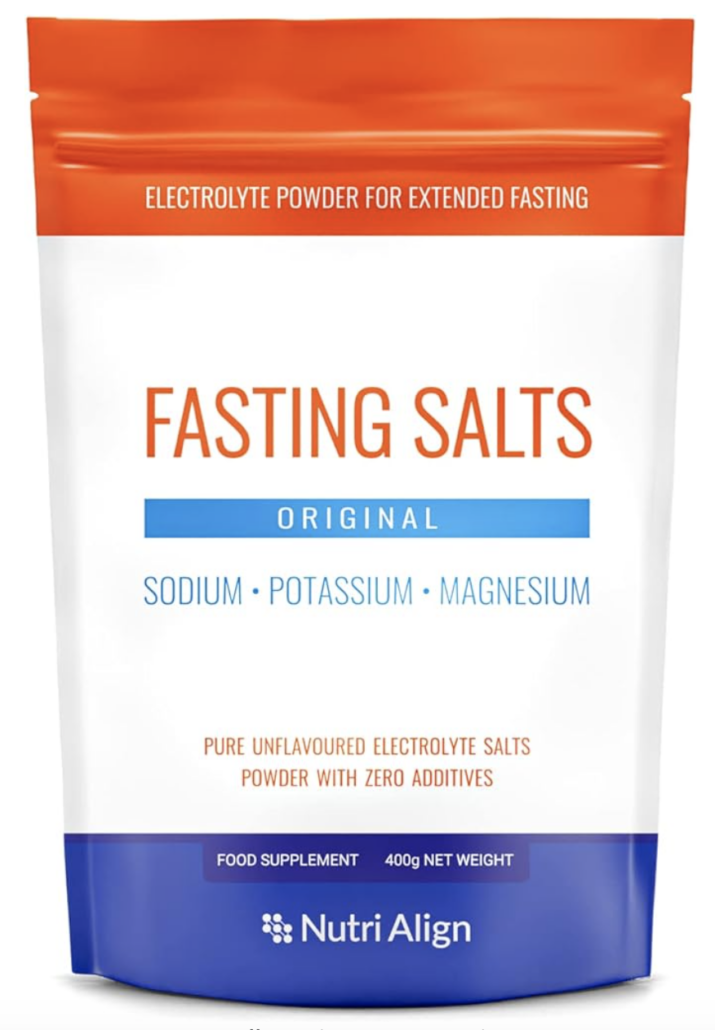
Fasting Salts provide sodium, potassium, and magnesium, and nothing else! No flavorings and no additives.
Pure and unflavoured, these mineral salts are formulated specifically to replenish your electrolyte levels during a water fast.
It’s important to note that these are very potent salts and should be used cautiously.
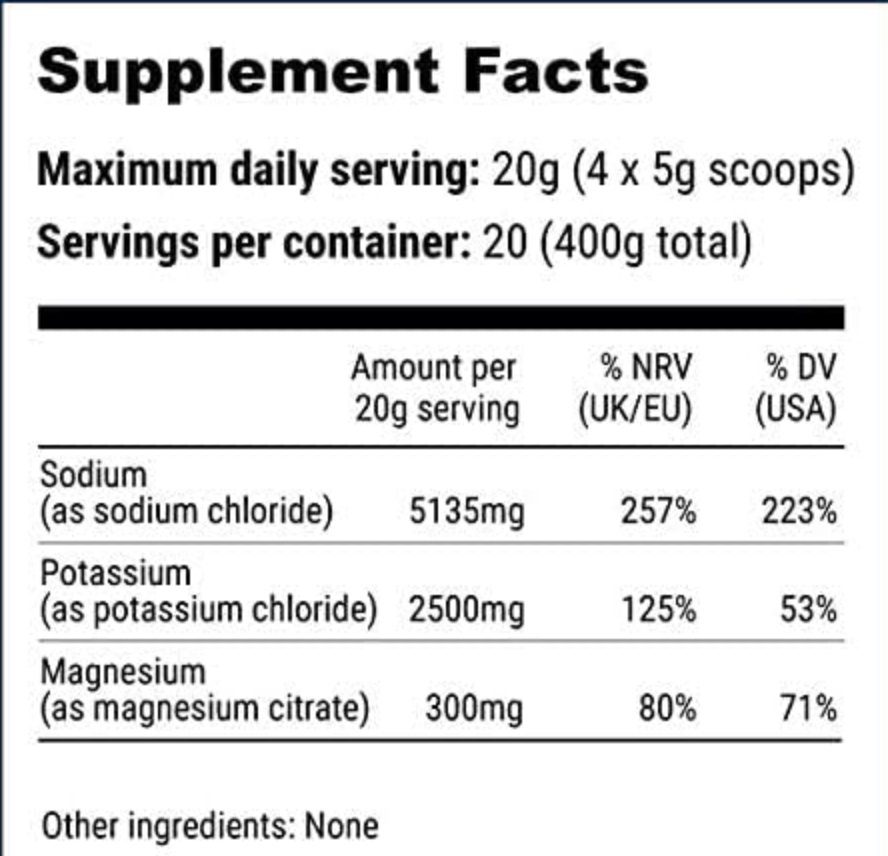
Keto Chow

Keto Chow is an electrolyte formula created by Carnivore enthusiast Dr. Ken Berry.
The Keto Chow formula is strictly focused on providing essential minerals like copper, magnesium, chromium, zinc, boron, and selenium, in addition to sodium,
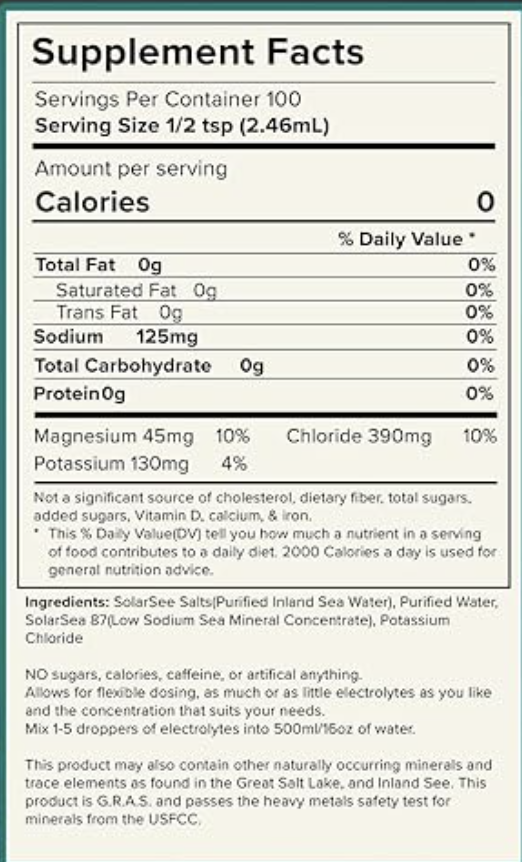
Hi-Lyte Electrolyte Mineral Powder–Natural Flavor
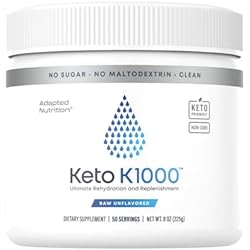
Hi-Lyte Keto K1000 electrolyte powder is a high-potassium supplement designed to help with hydration, increase cellular energy, and reduce side effects associated with intermittent fasting and ketosis, such as nausea, headache, and brain fog.
With 1,000mg of potassium, this trace mineral blend is tailor-made for keto and intermittent fasting enthusiasts. Simply mix one scoop into 16 oz of water.
With such high potassium, you need to avoid exceeding one serving every four hours or three servings a day.
For people who are new to Hi-Lyte it’s best to begin with half a serving to ensure tolerance.
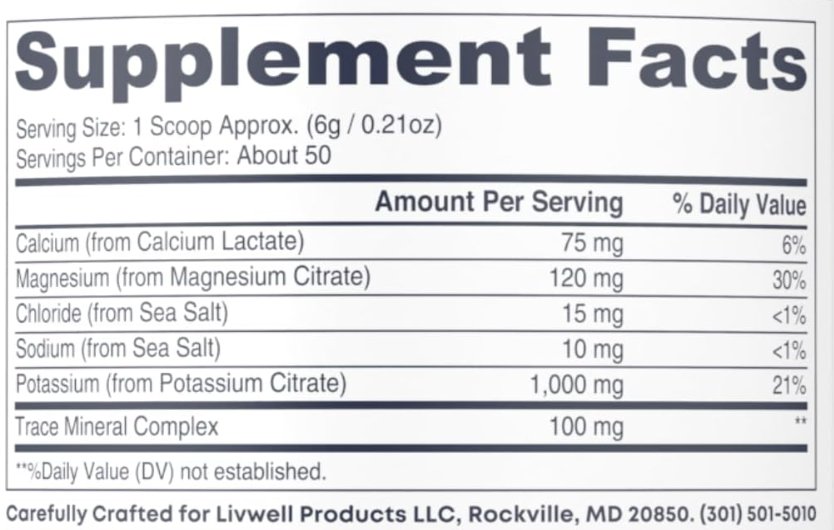
Dr. Bergs Electrolyte Powder
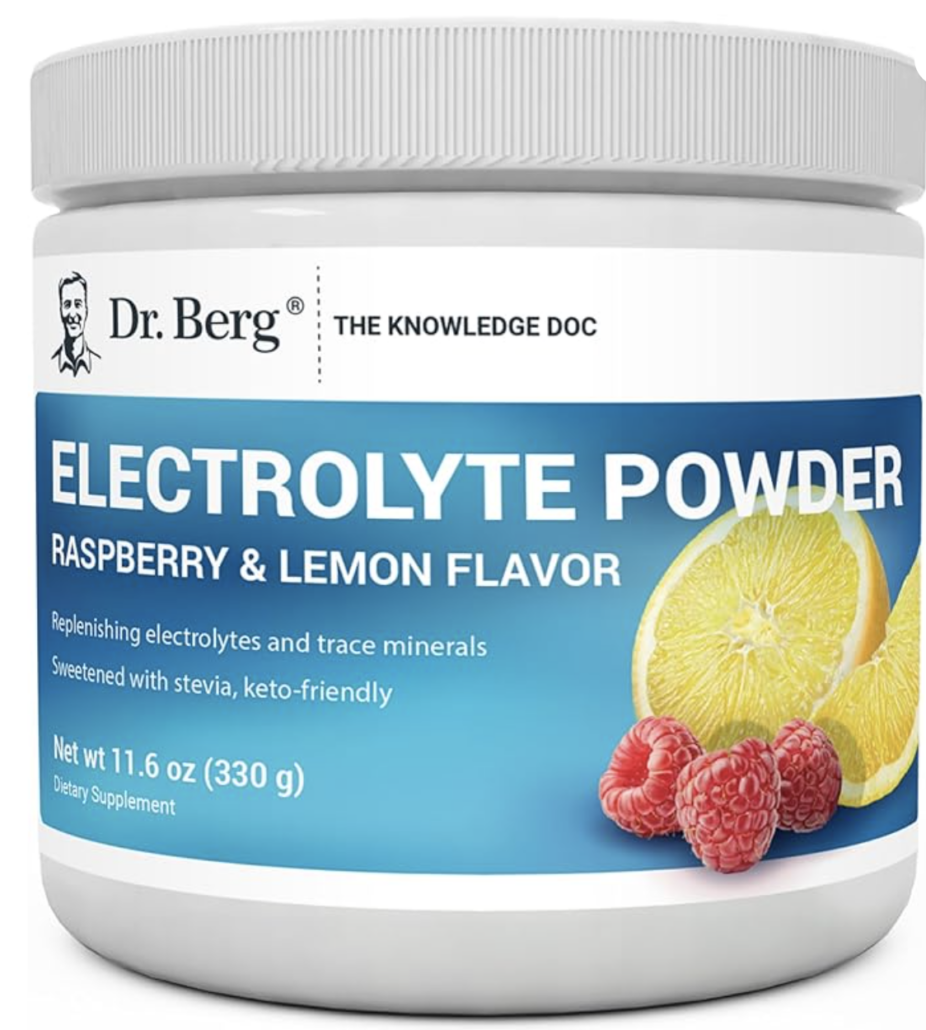
Dr. Berg is another keto enthusiast who developed his own electrolyte powder.
His formulation offers a blend of calcium, magnesium, and chloride from pink Himalayan salt, as opposed to cheap table salt that other brands may use. He also includes a proprietary trace mineral complex.
Each serving provides 1,000 mg of potassium–a very high, and potentially dangerous amount if you’re not careful.
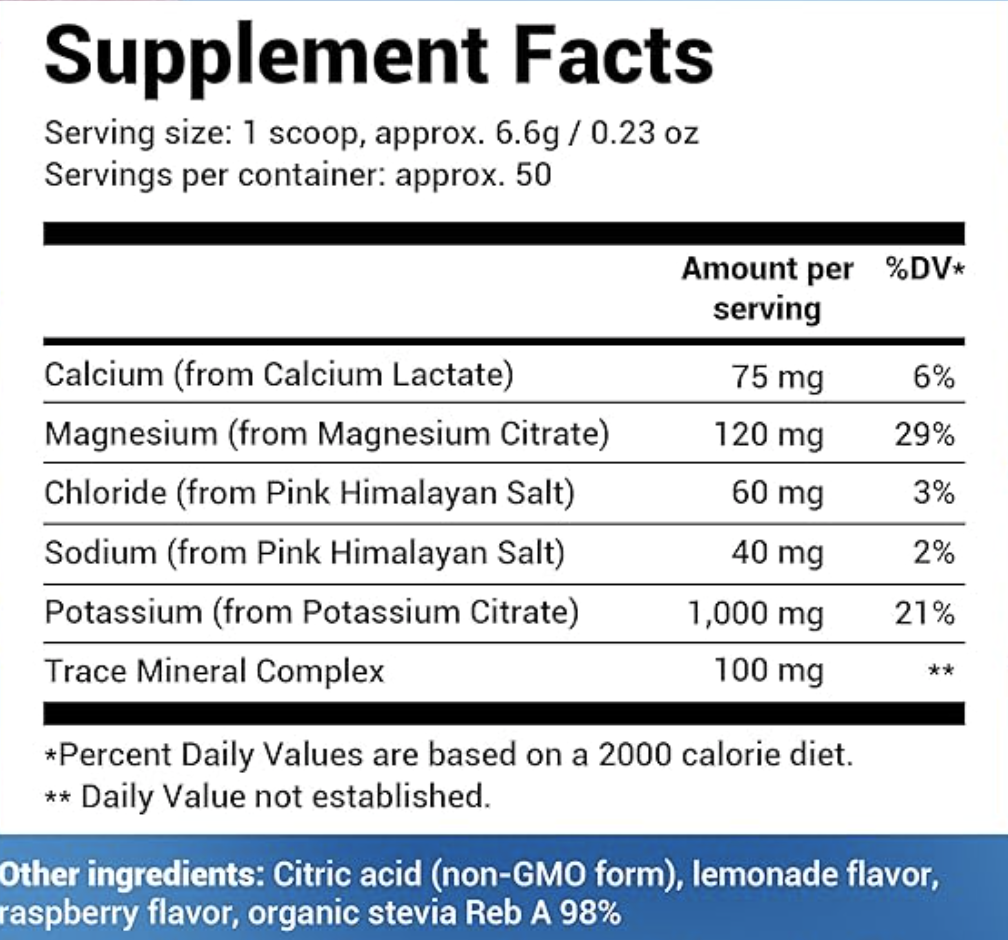
Electrolytes For Fasting: The Bottom Line
When fasting your body undergoes various physiological processes that can deplete electrolytes. Without consuming food, there’s no way of replenishing these essential nutrients without a non-caloric supplement.
Many people can do fine intermittent fasting without supplementing with electrolytes. But on prolonged fasts, you may need to replenish sodium, chloride, potassium, and magnesium in order to maintain vital physiological functions, reduce the likelihood of headaches, maintain energy levels, support your immune system, and stay hydrated.





















